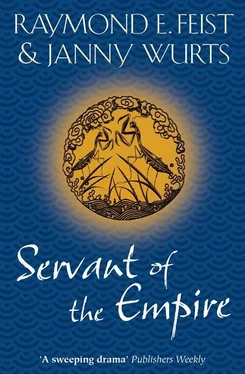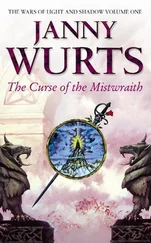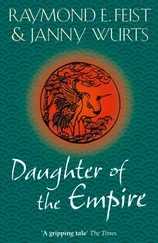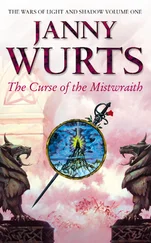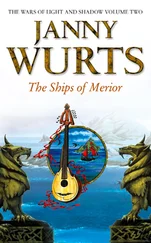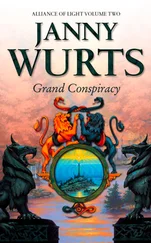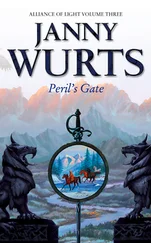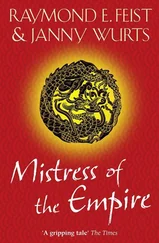‘Bring me my son,’ she commanded. Though she knew Ayaki would be soundly asleep, she had a sudden yearning for his noise, his mischief, and the warm weight of his small, muscular body in her arms.
• Chapter Three • Changes
The child turned over.
Ayaki sprawled upon the cushions, asleep. Boisterous for a short time, he had finally succumbed to exhaustion. Mara stroked his black hair away from his forehead, filled with love for her son.
Although the boy had his father’s stocky build, he had inherited quickness from her family. In his second year, he showed remarkable coordination, a fast tongue that drove the servants to distraction, and continually bruised knees. His smile had won the hearts of even the most hardened warriors who served on the Acoma estates.
‘You will be a fine fighter, and a greater player of the game,’ Mara mused softly. But now the boy’s toughness and quick wit had one opponent he could not overcome, his need for an afternoon nap. Though he was the light of Mara’s life, these brief interludes were welcome, for when awake Ayaki required three nurses to keep him occupied.
Mara tucked her son’s robe about him and straightened his outflung limbs. She settled back upon her cushions in thought. Many recently planted seeds must bear fruit before Ayaki came of age. When that day dawned, her father’s old enemies the Anasati would end the alliance begun for the sake of the boy. What goodwill Mara had secured through giving birth to the first grandson of Lord Tecuma of the Anasati would end, and the debt incurred by Buntokapi’s premature death would be exacted. Then must the Acoma be unassailably strong, to weather the change in rule as Mara turned over control of her house to an inexperienced son. The Minwanabi menace must be fully eliminated before another powerful enemy challenged a young Lord.
Mara considered the years ahead, while afternoon sunlight striped the drapes and slaves returned to trim the akasi. The gardening around the walkways occurred often enough that she had become indifferent to the clack of shears. Except for today, when that normal household sound was repeatedly interrupted by sharp commands from the overseer and the frequent slap of the short leather quirt he carried. Normally the lash was ceremonial, a symbolic badge of rank carried on the belt – Tsurani slaves seldom required beating. But the slaves from Midkemia were indifferent to their overseer’s displeasure. Their respect for their betters was nonexistent, and whippings shamed them not at all.
Tsurani slaves found the Midkemians as enigmatic as Mara did. Raised in the knowledge that their humble devotion to work was their only hope of earning a higher place upon the Wheel that bound the departed to rebirth and life, they worked tirelessly. To be beaten for laziness, or to disobey their lawful masters in any way, was to earn the permanent disfavour of the gods, for below slave was only animal. And once returned from the Wheel of Life in a lower form, they would find salvation from the countless rebirths in pain and deprivation impossible.
Disturbed from contemplation by a heated argument, Mara realized with annoyance that the barbarians still had not learned proper manners. The only change in them since the slave auction seemed to be the increased number of lash welts on their backs and a marked improvement in the command of their masters’ language.
‘The gods’ will? That’s hogwash! ’ boomed one in heavily accented Tsurani. For a brief moment, Mara wondered what ‘hogwash’ meant. Then the barbarian voice resumed. ‘I call it plain stupidity. You want work from these men, you’ll take my suggestion, and thank me for it.’
The overseer had no ready reply for slaves who talked back at him. Such things did not arise in Tsurani culture, and he had no means of coping except to slap the offender with his quirt and swear in an embarrassing display of temper.
This had no effect. Disrupted utterly from her thoughts, Mara heard sounds of a scuffle, and then words of unmistakable rage.
‘Strike me again with that, little man, and I’ll drop you head first into that pile of six-legger’s dung on the other side of that fence.’
‘Put me down, slave!’ screeched the overseer. He sounded genuinely frightened, and since the situation had plainly got out of hand, Mara arose to intervene. Whatever ‘hogwash’ might be, it wasn’t something that indicated proper deference to authority.
She crossed the study, whipped the drapes back, and found herself looking up across an impressively muscled expanse of shoulder and arm. The redheaded Midkemian who had been at the root of the commotion at the auction had a fist twined in the overseer’s robe, lifting him into the air, his feet kicking above the ground. When he saw his mistress, the overseer’s eyes rolled back in his head, and his lips moved in prayer to Kelesha, goddess of mercy.
The barbarian simply looked down at the diminutive lady in the doorway, his expression bland but his eyes as blue and hard as the sword metal that abounded on the Midkemian side of the rift.
Mara felt her own anger rise at that openly rebellious stare. She curbed her temper and spoke evenly. ‘If you value life, slave, let him go now!’
The redhead recognized authority in her dark eyes. Still, he was insolent. He considered her command an instant; then a wicked grin spread across his face and he opened his fist. The overseer dropped without warning, buckled at the knees, and landed on his seat in the middle of Mara’s favourite flower bed.
The grin sparked Mara’s anger. ‘You lack any hint of humility, slave, and that is a dangerous thing!’
The redhead stopped smiling, but his eyes remained upon his mistress with an interest that now had more to do with her thin robe than any respect for her words.
Mara was not too angry to notice. Suddenly made to feel undressed by the barbarian’s frank appraisal, she felt her anger mount. She might have ordered the redhead’s immediate death as an example to the others, except that Arakasi’s earlier expression of interest in the barbarians made her pause. None of the Midkemians behaved in an appropriate way, and unless she could learn the reason why, the only expedient that could end the problem was to slaughter her purchases out of hand. Still, an object lesson was required. Turning to a nearby pair of guards, she said, ‘Take this slave out of sight and beat him. Do not let him die, but make him wish to. If he resists, then kill him.’
Instantly two swords appeared, and, with clear intent to brook no resistance, the guards led the outworlder away. As he moved down the path, the imminent prospect of a beating seemed to have no effect on his self-important posture. The barbarian’s lack of fear at his coming ordeal served only to irritate Mara more, for it was the one thing about the man that was Tsurani-like and admirable. Then Mara caught herself: about the man? What could she be thinking of? He was only a slave.
Jican chose that moment to make an appearance. His polite knock on the doorframe broke through Mara’s angry contemplation.
She whirled and snapped across the room, ‘What!’
The sight of her hadonra jumping back in fright made her feel foolish. She motioned for her overseer to remove himself from the flower bed, then retired to her cushions, where Ayaki still lay asleep.
Jican stepped into the room from the hallway. ‘Mistress?’ he inquired meekly.
With a wave at her hadonra, Mara said, ‘I am about to learn why Elzeki here must argue with slaves.’
The overseer stepped through the outer door, flushing visibly at his mistress’s disapproval. Elzeki was little better than a slave himself, an untrained servant given the office of managing workers about the estate. And authority given to him could be taken away. He prostrated himself upon the waxed wood floor and protested hotly in his own defence. ‘Mistress, these barbarians have no sense of order. They are without wal.’ He used the ancient Tsurani word meaning ‘centre of being’ – the soul that defined one’s place in the universe. ‘They complain, they malinger, they argue, they make jokes …’ Frustrated to the point of tears, he finished in an angry rush. ‘The redheaded one is the worst. He acts as if he were a noble.’
Читать дальше
